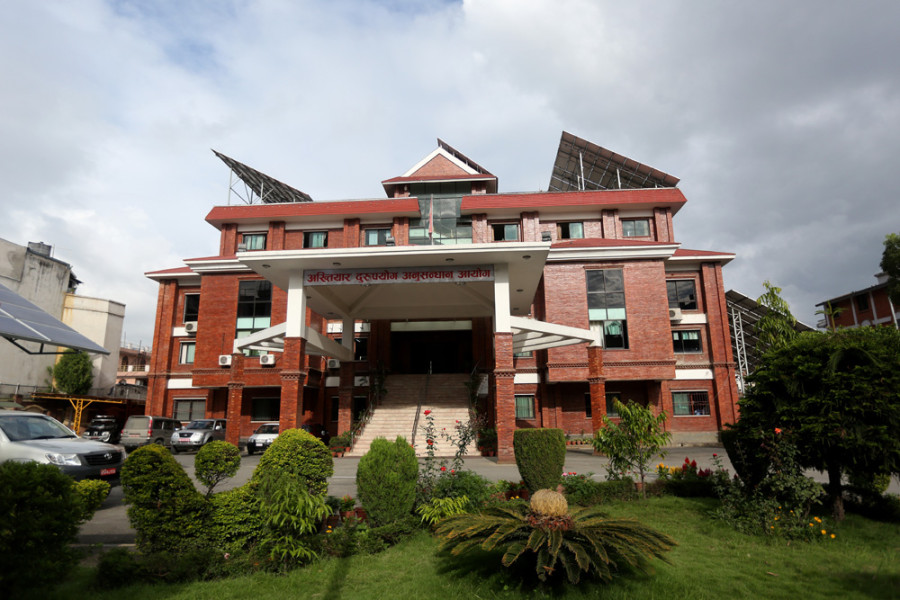National
Anti-graft body asks government agencies to furnish progress report on ‘sick projects’
The commission is investigating around 100 critically sick projects.
Prithvi Man Shrestha
The Commission for Investigation of Abuse of Authority has sought a progress report on the implementation status of its recommendations regarding the ‘sick projects’ that it had identified in a study last fiscal year.
A study report ‘Status of the contract management of the construction works under the Nepal government and Analysis’ unveiled in January, identified 1,848 contracts related to seven ministries to be sick. The projects were considered sick because they were not completed even after their completion deadline expired before December 2017, with some having remained idle for the last 8-9 years. The combined value of the contracts stands at Rs118 billion. Further 1,032 contracts of various construction projects had remained idle without extension of their deadlines.
After releasing the report, the commission asked the government agencies to address the issues of the sick projects at the earliest as a huge amount of the government’s resources being mobilised or planned for these projects were at stake.
The commission said that it has also conducted a detailed investigation on around 100 contracts after finding evidence of irregularities.
Last week, the commission sought the implementation status of those recommendations in a prescribed format from the ministries concerned. “The ministries had promised the implementation of the recommendations made by us. As we are closely monitoring the development in these projects, we sought the progress report,” said Pradeep Koirala, spokesperson for the commission.
As per the CIAA’s instruction, the ministries concerned should submit their progress report with information such as project name, contact number, project site, details about the contract, contractor’s name, contract amount, estimated cost, contract signing date, initial completion deadline, extended deadline, additional costs added, amount related to variation order, status of progress and current status of the contract whether it is still running, completed or terminated.
The commision had suggested that the government agencies should make an assessment of contractors’ financial strength, human resources, technical know-how and physical capacity for bid evaluation, prepare certain standards for approving variation order, a system where additional cost is approved for additional works not mentioned in the design of the project, adjustment of public procurement law and regulation, adequate budget allocation, adequate preparations before awarding of the contract and coordination among the government agencies.
These measures were suggested after finding a number of anomalies during the awarding and management of the contract during the study. One of the key issues raised by the report is that contractors running away after receiving the advance mobilisation from the government agencies.
The report stated that the government agencies are at risk of losing around Rs23 billion in advance mobilisation, as the contractors used the funds in areas other than what it was meant for.
The report is particularly harsh on the government agencies for failing to take timely action against the contractors who failed to perform. Despite contractors running without notifying the government agencies, the government agencies failed to take action based on the contract’s provision of ‘Fundamental Breach of Contract.’
According to the report, the government offices extended the deadline as many as eight times without a valid reason, no alternative measures were taken even though some projects could not be completed even after 8-9 years and the government too failed to make available the budget on time and failed to monitor the implementation of the projects in a timely manner.
After releasing the report, the commission had held consultations with the officials of various ministries about these sick projects. With a huge amount of the government’s resources being spent on the construction projects, the commission’s officials fear they may be running the risk of financial irregularities.
“So, we have also been following the progress in the sick projects with the government,” said spokesperson Koirala.
One of the government agencies getting the commission’s letter is the Department of Roads, under the Ministry of Physical Infrastructure. Almost half of the total sick projects included in the commission’s report were under the ministry. Out of 1,848 projects under this ministry as many as 906 are sick, according to the report.
The spokesperson for the Department of Roads, Shivahari Sapkota, said after receiving the commission’s letter, the department had sought the progress in each sick project identified by the commission from the offices under its jurisdiction. “We are collecting data and will soon submit the details to the commission,” he said.
According to Sapkota, the department has extended the deadline for most of the sick projects until June 4 next year. This will be the last deadline extension as per the recently amended public procurement regulation. “We have terminated the contract of some of the projects as well,” Sapkota said. But he didn’t elaborate.




 9.83°C Kathmandu
9.83°C Kathmandu














